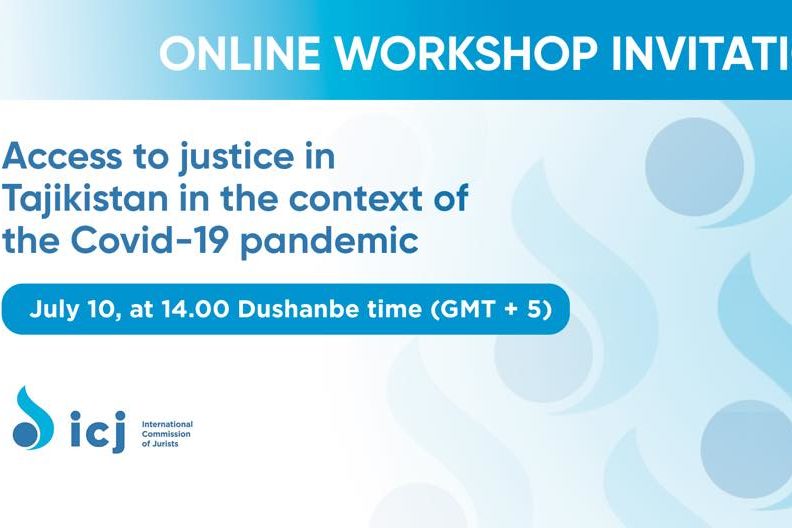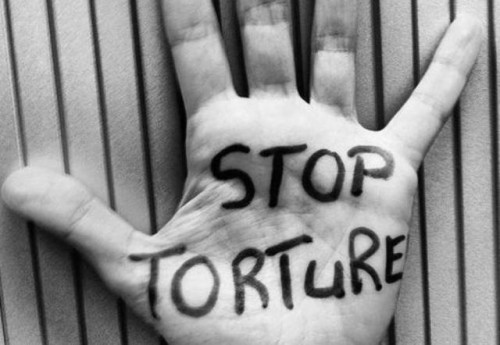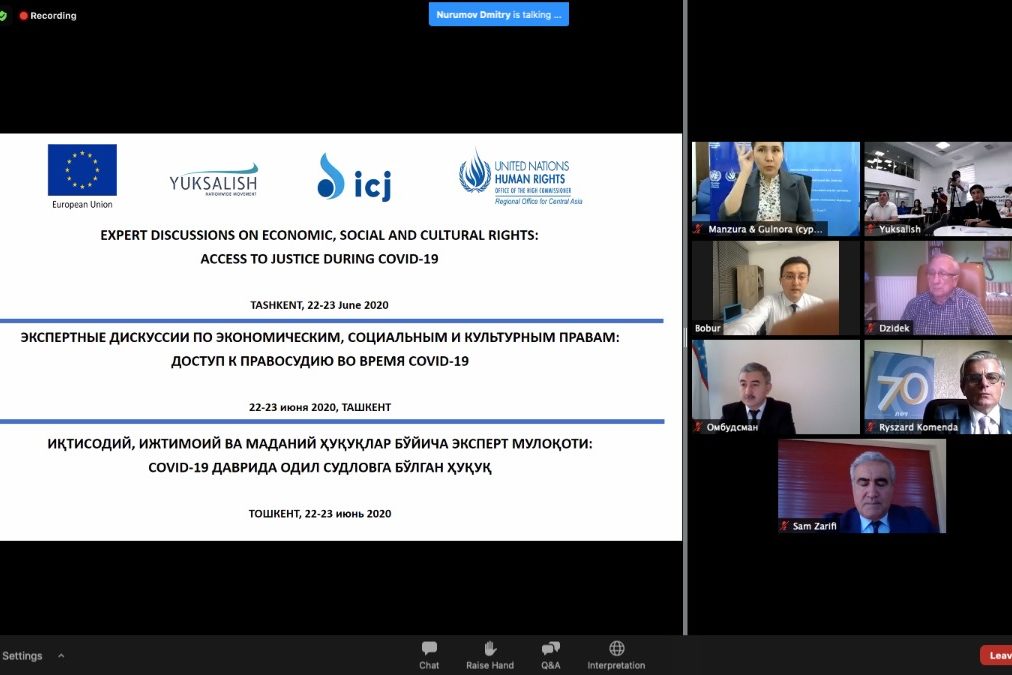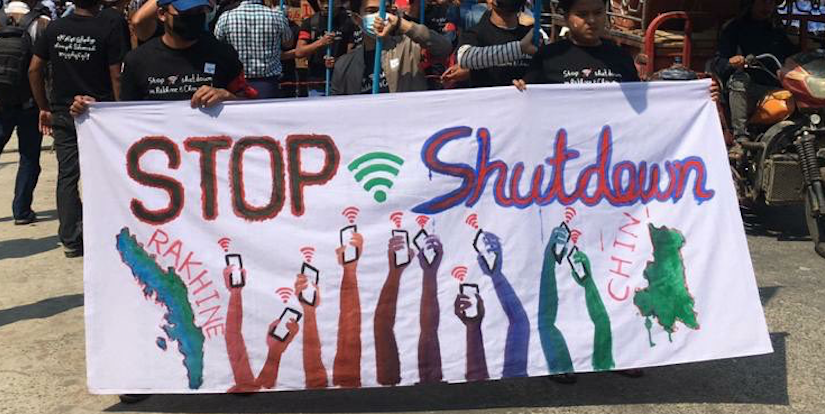
Jul 9, 2020 | Agendas, Events, News
The ICJ is holding an online discussion for lawyers and other representatives of civil society in Tajikistan on access to justice in the context of the Covid-19 pandemic. The discussion is held on 10 July 2020 from 14.00 to 17.00 Dushanbe Time (GMT + 5) on the GoToMeeting platform
The discussion aims to raise some of the main issues that lawyers face in providing legal representation both in and outside of courts.
The event will present an opportunity for practicing lawyers, NGOs and IGOs to discuss the recent challenges that the legal profession faced in Tajikistan as well as seek some of the solutions based on international law and best practices of other countries.
During the discussion, relevant international law and standards as well as comparative examples from the Central Asian countries and Azerbaijan will be discussed.
To participate in the discussions registration is required on the following link : https://forms.gle/QRywqBFPSxfR5eyk7
Working languages of the event are Russian and Tajik.
Contact:
Dilshod Juraev, t: +992 77 700 18 34 ; e: Dilshod.jurayev(a)icj.org

Jun 26, 2020 | News
On the occasion of the International Day in Support of Victims of Torture, the ICJ, Advocacy Forum (AF) and Terai Human Rights Defenders Alliance (THRD Alliance) voiced concerns about the near total failure by authorities to investigate and prosecute acts of torture in Nepal.
Nearly two years after provisions in the new Penal Code that criminalized torture came into effect, not a single torture prosecution appears to have been brought. There have also been very few instances in which victims have received an effective remedy and reparation for their ill-treatment. Nepal has failed to meet its obligations in this regard under article 2(3) of the International Covenant of Civil and Political Rights and article 14 of the Convention Against Torture.
“Nepal has an obligation under international law to hold perpetrators accountable for acts of torture and cruel, inhuman or degrading treatment. This includes obligations as a party to the Convention Against Torture and the international Covenant on Civil and Political Rights,” said Frederick Rawski, ICJ Asia-Pacific Director. “It is disturbing to see that two years after the rightfully celebrated Penal Code provisions criminalizing torture have come into effect, the government has yet to successfully prosecute any acts of torture, which by all accounts continue to occur on a frequent basis.”
The Advocacy Forum and THRD Alliance both published reports today that document instances of torture and other ill-treatment against detainees over the past year. Some 20 percent of the more than 1000 detainees interviewed reported some form of unlawful ill-treatment during confinement.
“Although in some locations there appears to be some improvement in the treatment of detainees, torture and ill-treatment remains far too prevalent,” said Om Prakash Sen Thakuri, Advocacy Forum Executive Director. “Police still continue to rely on “confessions”, typically obtained by ill-treatment or coercion during interrogation, as opposed to conducting proper investigations. Our police institutions need serious reform to ensure that investigative practices conform to international law and standards.”
In a separate report analyzing the obstacles faced by victims in seeking justice for torture and ill-treatment, the THRD Alliance documented the complex challenges faced by torture survivors seeking accountability in the formal justice system. These obstacles included a frequently refusal by police to file a First Information Report on allegations of ill-treatment, statutes of limitation preventing cases from being prosecuted, and a lack of independence of police investigations in the rare cases when they do move forward.
“Despite repeated public commitments by justice sector and human rights institutions, such as the National Human Rights Commission and the Office of the Attorney General, torture survivors still struggle to have their voices heard or have their cases addressed,” said Mohan Karna, Executive Director of the THRD Alliance. “We urge the authorities at both the federal and provincial levels to take action to address the concerns of victims and to institute policies – such as establishing robust detention monitoring and internal accountability mechanisms – that will deter future acts of torture and ill-treatment.”
On the occasion of the International Day in Support of Victims of Torture, the three organizations urged the Government of Nepal to:
- Carry out prompt, thorough, impartial and effective investigations into all allegations of torture and ill-treatment, and to bring prosecutions where warranted under the criminal provisions of the Penal Code.
- Institute structural reform within the police including the establishment of a separate and independent mechanism to investigate allegations of torture and ill-treatment involving police personnel.
- Ensure public availability statistics on the investigation, prosecution and other action taken in response to allegations of torture and ill-treatment.
- Amend the Penal Code and other relevant provisions of law to eliminate the statute of limitations in torture cases, and to ensure that the definition of torture is in line with international law.
- Establish an independent preventative mechanism for monitoring of detention centers.
- Become party to the Optional Protocol of the Convention on Torture
Background
International Day in Support of Victims of Torture is marked worldwide on 26 June every year. Under the International Covenant on Civil and Political Rights (ICCPR) and Convention against Torture and Other Cruel, Inhuman or Degrading Treatment or Punishment (CAT), to which by Nepal is a party, the authorities to investigate, prosecute, punish and provide effective remedies and reparation for the crimes of torture and other acts of ill-treatment.
The Penal Code criminalizing torture came into force in August 2018. While it was welcome as positive step, the provisions fall short of international standards in a number of respects, including failure to recognize the continuous nature of the crime of enforced disappearance or its status as a crime against humanity; an unacceptably brief six-month limitation period to file complaints; and penalties incommensurate with the gravity of the crimes.
Download
Nepali (PDF)
English (PDF)
Contact
Frederick Rawski, ICJ Asia-Pacific Director, e: frederick.rawski@icj.org, t: +66 644781121
Om Prakash Shen Thakuri, AF, Executive Director, e: opsenthakuri@gmail.com, t: +977 9841275732
Mohan Karna, THRD Alliance, Executive Director, e: karnamohan90@gmail.com, t: +977 9841449139

Jun 22, 2020 | News
Today, the ICJ, the Regional Office of the UN High Commissioner for Human Rights (OHCHR) for Central Asia and the Nationwide Movement “Yuksalish” are holding an Expert Discussion on the impact of COVID-19 on access to justice for economic, social and cultural rights (ESC rights) in Uzbekistan and comparative experiences from Europe and Central Asia.
The Fifth Expert Discussion, Access to justice in times of COVID-19, will address issues including access to a lawyer and access to court.
The event will present an opportunity to national and international experts, including lawyers, judges, members of UN human rights bodies, civil society, and other experts to debate questions of fundamental importance for ensuring access to justice and the protection of human rights in Uzbekistan.
“The COVID-19 pandemic has put new challenges before justice institutions around the world, including in Uzbekistan. These measures affected access to lawyers and courts judiciary therefore impeding full access to justice. This event will present an opportunity to discuss the solutions of States from around the globe about their responses to the pandemic. We believe that sharing experience among judges, lawyers and international experts from around the world will enrich the National debate and give an impulse for further development and the independence of the judiciary in Uzbekistan” said Akmal Burkhanov, Chairperson of the Nationwide movement “Yuksalish”.
“The pandemic became the so-called “maturity test” for the justice system and many of the urgent issues should be resolved in the light of the anti-COVID-19 measures taken. Therefore, I would also see the pandemic as an opportunity. The opportunity for transforming, changing for the better the functioning of traditional courts, provided that a high quality of justice and respect for individual rights are at the forefront of all changes,” pointed Eduards Stiprais, EU Ambassador to Uzbekistan.
Ryszard Komenda, Regional Representative of the UN Office for Human Rights for Central Asia quoted the UN High Commissioner for Human Rights, Michelle Bachelet, who stated that “in order to cope effectively with the pandemic states may need to introduce certain restrictions on the exercise of certain human rights, however, such restrictions need to be necessary, proportionate, and non-discriminatory”. Mr. Komenda noted that “the impact of the regulations on lockdown affected the day-to-day work of courts and lawyers. From the perspective of international human rights standards, it is crucial that the right of individuals to an operative and independent judicial system, in particular the right to an effective remedy, habeas corpus guarantees and access to a lawyer of one’s choosing are strictly adhered to”.
“Our fifth Expert Discussion on economic and social rights, is devoted to addressing the major problems people have in getting access to justice and defending their rights during the global COVID-19 pandemic,” said Sam Zarifi, the ICJ Secretary General.
“The ICJ has documented how around the world the pandemic has severely affected peoples’ right to health, to food, to water, to education and to sanitation, and we have also seen the additional difficulties facing people with lower income and access to the levers of power.”
“We aim to discuss how international law and national best practices can help the judiciary and legal system alleviate some of the human rights issues arising from Covid-19 in Uzbekistan, and maybe even build a more responsive and accountable system after the pandemic.”
Background:
The Expert Discussions on ESC rights aim to raise awareness about the implementation of international law and standards on ESC rights by the national justice system, to facilitate access to justice in relation to ESC rights and promote effective use of international law on ESC rights at the national level. Each Expert Discussion is attended by international and national experts.
The first discussion was held in September 2018 on international standards in labour rights. The second meeting, held in December 2018, concerned judicial application of the principle of non-discrimination; the third meeting, held in March 2019, was dedicated to the rights of people with disabilities, and the forth meeting, held in October 2020, discussed the right to adequate housing in Uzbekistan.
Uzbekistan ratified the International Covenant on Economic, Social and Cultural Rights (ICESCR) in 1995.
The Expert Discussions are organized by the ICJ within the framework of the “Advancing Civil Society in Promoting economic, social and cultural rights (ESCR) Standards in Uzbekistan (ACCESS)” Project funded by the EU through the European Instrument for Democracy and Human Rights (EIDHR).
Contact:
Dilfuza Kurolova, ICJ Legal consultant, t: +998 90 9050099 ; e: dilfuza.kurolova(a)icj.org
Agenda:
English version
Russian version
Uzbek version

Jun 20, 2020 | News
As the general internet shutdown in Rakhine and Chin states reaches one year, the ICJ repeated its call for the Myanmar Government to end mobile internet restrictions and temporarily halt hostilities with the Arakan Army.
The ICJ also called for an amendment of Section 77 of the Telecommunications Act, pursuant to which the government can order telecommunications providers to suspend internet services.
“The internet shutdown in Rakhine and Chin states stifles freedom of expression, prevents information-sharing, and exacerbates the plight of affected communities by impeding humanitarian and health access during a global pandemic,” said Frederick Rawski, ICJ Asia-Pacific Director. “Such a drastic measure is disproportionate and unnecessary. The government should focus on fighting COVID-19, instead of waging a battle against its own population.
The shutdown was first imposed on 21 June 2019 by the Ministry of Transport and Communications (MOTC), purportedly to facilitate government objectives in the armed conflict with the Arakan Army.
Section 77 of the Telecommunications Law authorizes the the MOTC to “direct the licensee to suspend a Telecommunications Service, to intercept, not to operate any specific form of communication, to obtain necessary information and communications, and to temporarily control the Telecommunications Service and Telecommunications Equipments” in the event of an “emergency situation” for the “public interest.” However, the law does not define the scope of an “emergency situation.” The ICJ previously described Section 77 to be vague, and warned of abuse by authorities in the absence of independent judicial oversight by civilian courts.
In April, as Myanmar encountered its initial cases of COVID-19, the ICJ highlighted how arbitrary and unnecessary online media restrictions not only violate a person’s right to freedom of expression and information, but also deny access by affected communities to essential health information. Access to health information is a component of the right to health protected under the International Covenant on Economic, Social and Cultural Rights (ICESCR), to which Myanmar is a party.
“The internet shutdown effectively deprives large swathes of the population in ethnic minority states of the benefits of government services, and information about its COVID-19 response,” said Frederick Rawski. “Such a blanket internet shutdown is not necessary for reasons of national security, and undermines the government’s own public health efforts.”
The ICJ recalled that the ICESCR requires States to observe the principle of non-discrimination in enacting measures to protect the right to health. The internet shutdown clearly has a disproportionately adverse impact on the human rights of members of ethnic minorities.
Despite appeals from UN officials, rights groups, ethnic armed organizations, and ambassadors to Myanmar, the Myanmar Government still refuses to hold a ceasefire throughout the country, including areas of Rakhine and Chin states where the Arakan Army operates. The conflict has resulted in deaths, many from unlawful killings, as well as serious physical and emotional injury, and mass displacement of persons.
Download
Myanmar-Internet-Shutdown-Press-Release-2020-BUR (PDF)
Contact
Frederick Rawski, ICJ Asia-Pacific Regional Director, e: Frederick.rawski(a)icj.org
Related work
Publication: Myanmar’s ongoing Internet shutdown and hostilities threaten right to health during COVID-19
Statement: Government must lift online restrictions in conflict-affected areas to ensure access to information during COVID-19 pandemic
Report: Curtailing the Right to Freedom of Expression and Information in Myanmar

Jun 18, 2020 | Advocacy, Open letters
The Swiss Section of the ICJ sent today to the Swiss Parliament (National Council) a letter warning that, if approved, the current Draft Federal Law on Police Measures against Terrorism, tabled before them would clash with the country’s obligations under international human rights law. The ICJ supports this initiative of its Swiss Section.
The letter outlines several key concerns with the legislative proposal that could be used to unduly restrict aspects of freedom of expression, the right to liberty, and the rights of the child , in contravention of international law guarantees.
The National Council holds today a crucial discussion on the draft legislation.
Switzerland-Anti terrorism law-Advocacy-2020-GER (the full letter, in German, PDF)









